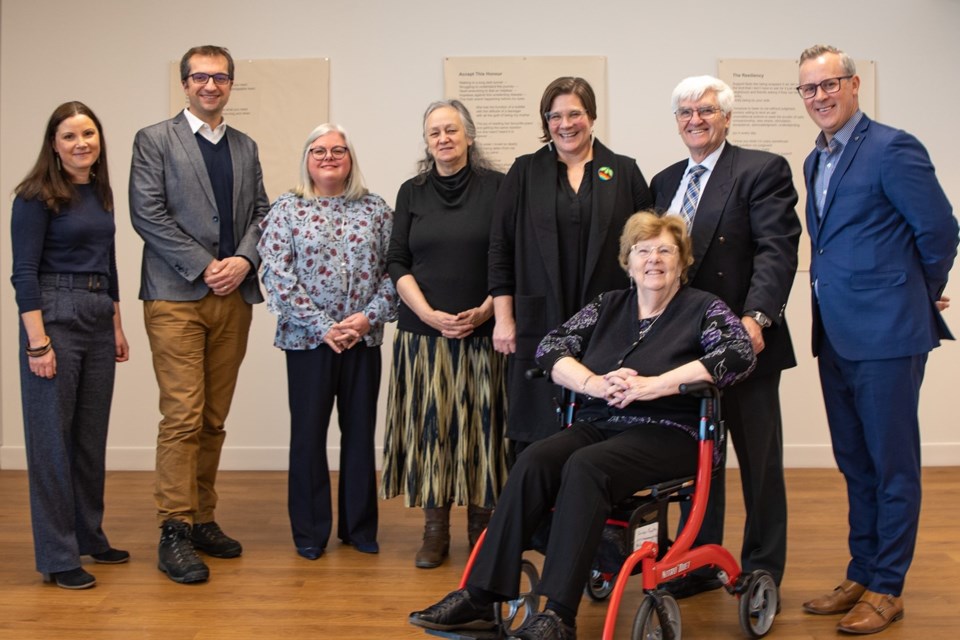Nipissing University officially launched Rare Dementia Support (RDS) Canada, a national support service for people living with rare or young onset dementia led by Mary Pat Sullivan, professor of social work and social gerontology.
Five to 25 per cent of people diagnosed with dementia are living with a rare, inherited or young onset dementia. RDS Canada will provide a virtual space for those affected, offering access to information, tailored individual and group support and guidance, and connection with others affected by similar conditions. The team includes dementia practitioner specialists, researchers, educators and individuals with lived experience through an Advisory Circle.
“There is a significant gap in supports available for people living with a rarer or young onset dementia,” said Sullivan. “RDS Canada will help narrow this gap for people living in Canada by connecting them with the information about their disease, resources and practitioners to support their wellbeing.”
Caroline and Ernest Payette addressed those assembled in support of Rare Dementia Support Canada, highly recommending the group for educational and social purposes as loved ones progress along the dementia path (see video below).
"We are going to tell you our story and we hope you can connect with it in several different ways," said Ernest, with regard to "your parents, yourselves, your family, and others you know. Because when we tell our story, that's who we are talking about, the people engaged in our daily lives."
Ernest shared that Caroline began to have trouble with visual and spatial tasks as far back as 2010. Those difficulties increased over the next few years, he said. Caroline, an "immaculate writer" and former teacher could no longer read or write near the level she once had. Caroline also experienced challenges with mobility and driving.
"Here, as you can see, is an extremely capable person," said Ernest as he smiled warmly to his partner, "who could no longer do the tasks that she had heretofore performed effortlessly and with a high degree of quality and efficiency. The question was why?"
Following years of dead ends and misdiagnoses, the Payettes found their answer: Caroline has posterior cortical atrophy (PCA), a rare form of dementia.
The establishment of RDS Canada was made possible thanks to a $400,000 grant from The Hilary and Galen Weston Foundation received by Nipissing University earlier this year. The service, delivered via Nipissing’s campus, is offered in partnership with Rare Dementia Support (RDS), University College London (UCL), in the United Kingdom.
RDS Canada offers support to people affected by:
- Young onset Alzheimer’s disease (YOAD),
- Frontotemporal dementia (FTD), including behavioural variant FTD (bvFTD) and primary progressive aphasia (PPA)
- Lewy body dementia (LBD)
- Posterior cortical atrophy (PCA)
“We are proud to host this leading national service at Nipissing University and of the work Dr. Mary Pat Sullivan and her team are undertaking that will benefit countless individuals in need of this specialized support,” states Kevin Wamsley, president and vice-chancellor, Nipissing University.
“It is exciting to see the Foundation’s investment and interest in brain health being realized in this way, and to know that this service will have such a far-reaching and positive impact on the lives of those affected by rare and young onset dementia,” said Jeffrey Coull on behalf of the Hilary and Galen Weston Family Foundation.
“I’m so pleased to share in this milestone occasion with Mary Pat and the entire RDS Canada team, and look forward to continued collaborations to advance support services for those affected by rare and young onset dementia around the globe,” said Sebastian Crutch, professor of neuropsychology, Dementia Research Centre, UCL, and Lead, Rare Dementia Support.
Following the launch announcement on Monday, December 5 at the NUSU Student Centre, attendees were invited to take part in a poetry installation developed through the Rare Dementia Support Impact Study. The installation, titled “Where to Begin,” consists of 36 poems offering personal accounts of what it is like to live with dementia. The poems are a result of a collaborative project led by Crutch. The exhibit is open to the public at the NUSU Student Centre through December 21.



